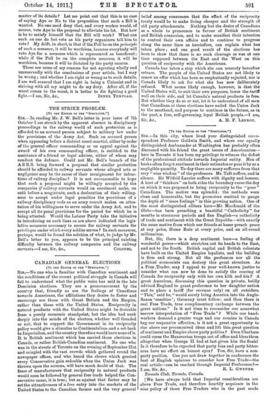CANADIAN GENERAL ELECTIONS
[To THE EDITOR Or THE "SPECTATOR."]
Sin,—No one who is familiar with Canadian sentiment and the conditions of the recent political struggle in Canada will fail to understand what the public voice has said in the late Dominion elections. They are a pronouncement by the country that, friendly as are the feelings of Canadians towards Americans, the affiliations they desire to foster and encourage are those with Great Britain and the Empire, rather than those with the United States. Reciprocity in natural products with the United States might be desirable from a purely economic standpoint, but the idea had sunk deeply into the minds of the electors, whether well founded or not, that to support the Government in its reciprocity policy would give a stimulus to Continentalism and a set-back to Imperialism, and the country therefore would have none of it. It is British sentiment which has carried these elections in Canada, or rather British-Canadian sentiment. No one who was in the streets of Toronto on the evening of September 21st and mingled with the vast crowds which gathered round the newspaper offices, and who beard the cheers which greeted every Conservative gain redouble when the Union Jack was thrown upon the screens, will have much doubt of that. The fears of manufacturers that reciprocity in natural products would soon be followed by general free trade helped the Con- servative cause, it is true; but as against that factor may be get the attractiveness of a free entry into the markets of the United States to the Canadian farmer and the very general belief among consumers that the effect of the reciprocity treaty would be to make living cheaper and the strength of old party attachments. Nothing but the desire of Canadians as a whole to pronounce in favour of British sentiment and British connexion, and to make manifest their intention to control their own affairs and to continue to progress along the same lines as heretofore, can explain what has taken place ; and one good result of the elections has been to show that there is no such cleavage as was at one time supposed between the East and the West on this question of reciprocity with the Americans.
Canada has taken a step which she can scarcely hereafter retrace. The people of the United States are not likely to renew an offer which has been so emphatically rejected, nor is Canada likely to ask for what she has now deliberately refused. What seems likely enough, however, is that the United States will, to suit their own purposes, lower the tariff wall on their side, and let Canada's natural products in free. But whether they do so or not, let it be understood of all men that Canadians at these elections have nailed the Union Jack to the masthead, and purpose to continue in the future, as in the past, a free, self-governing, loyal British people.—I am,


















































 Previous page
Previous page